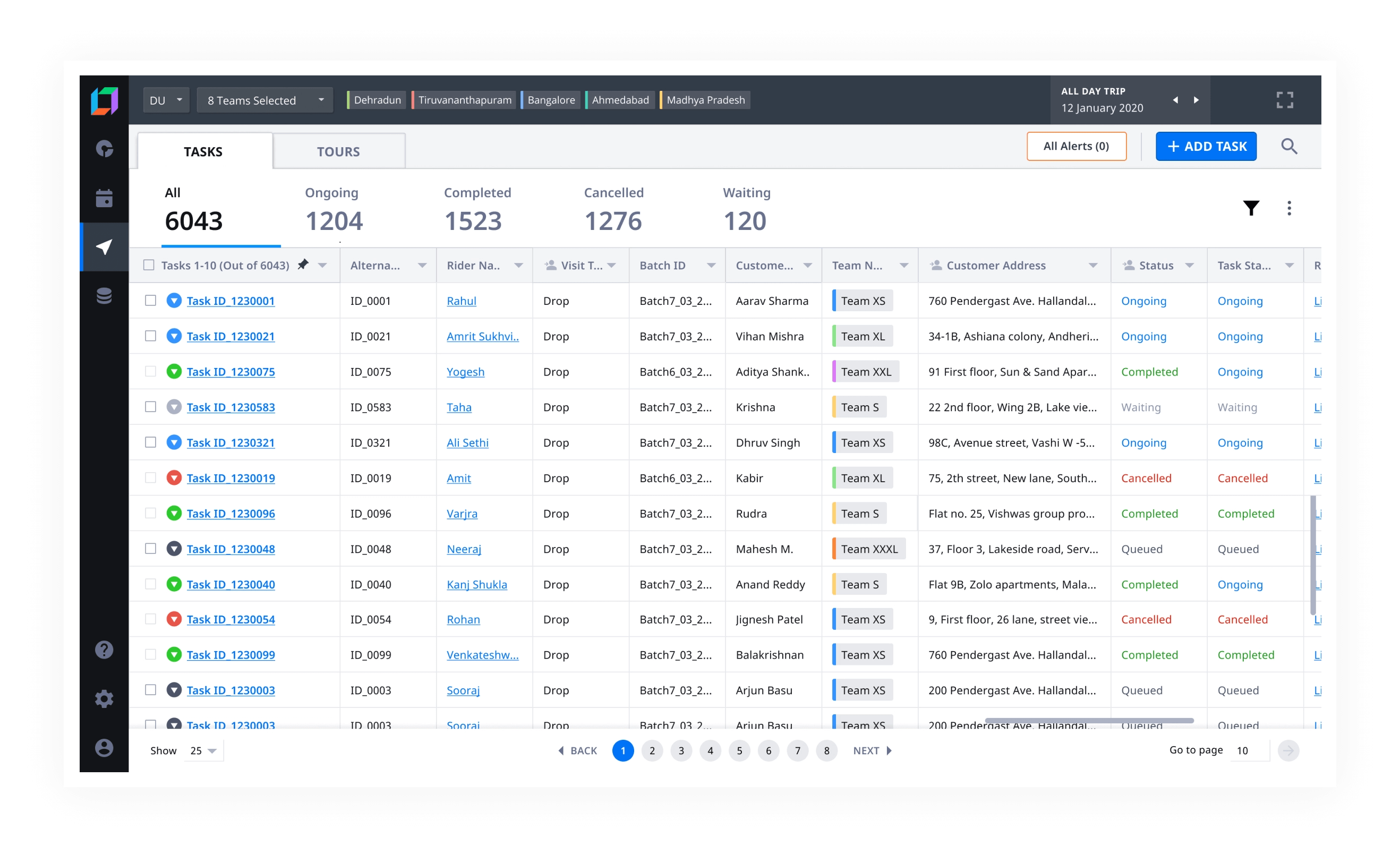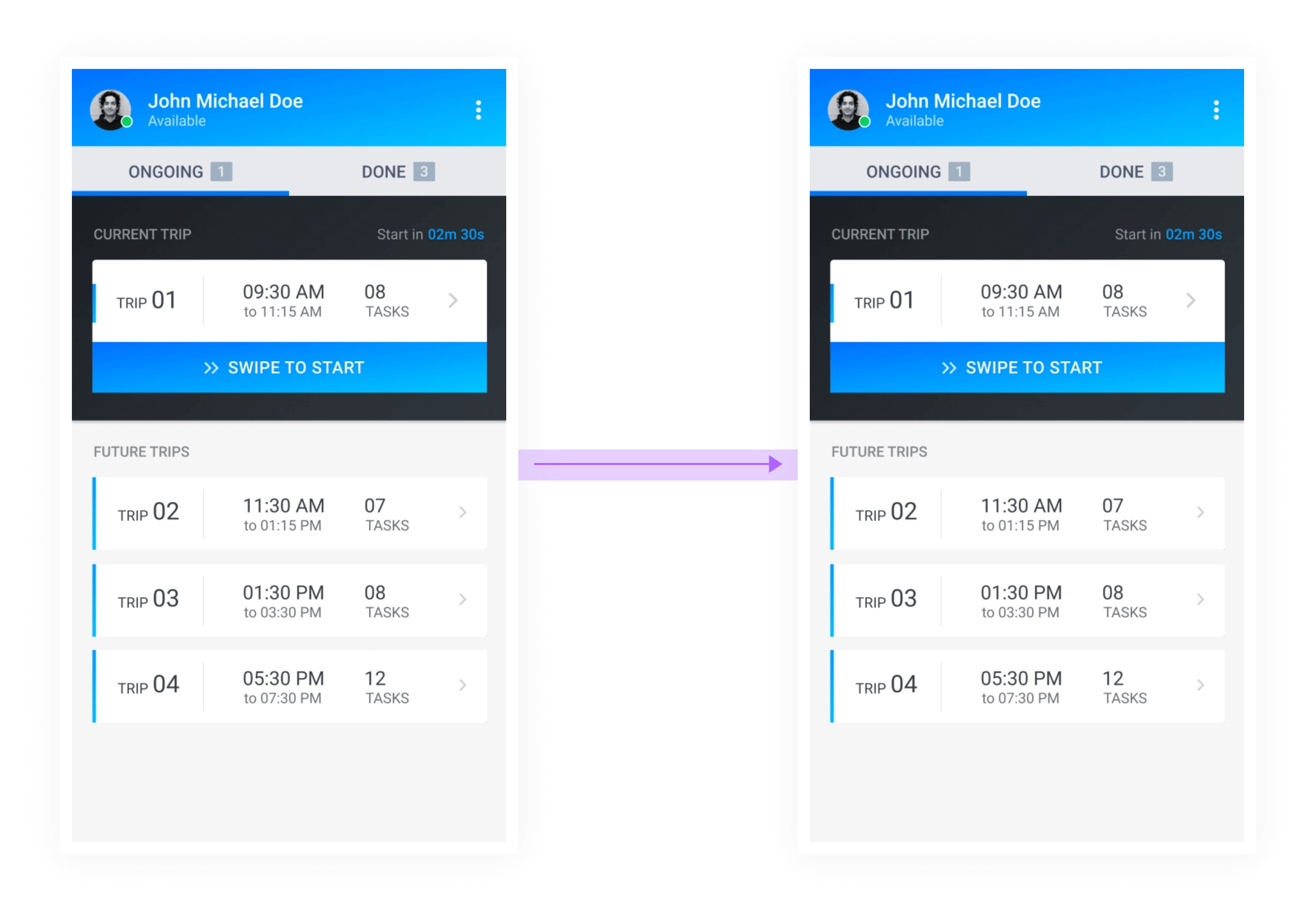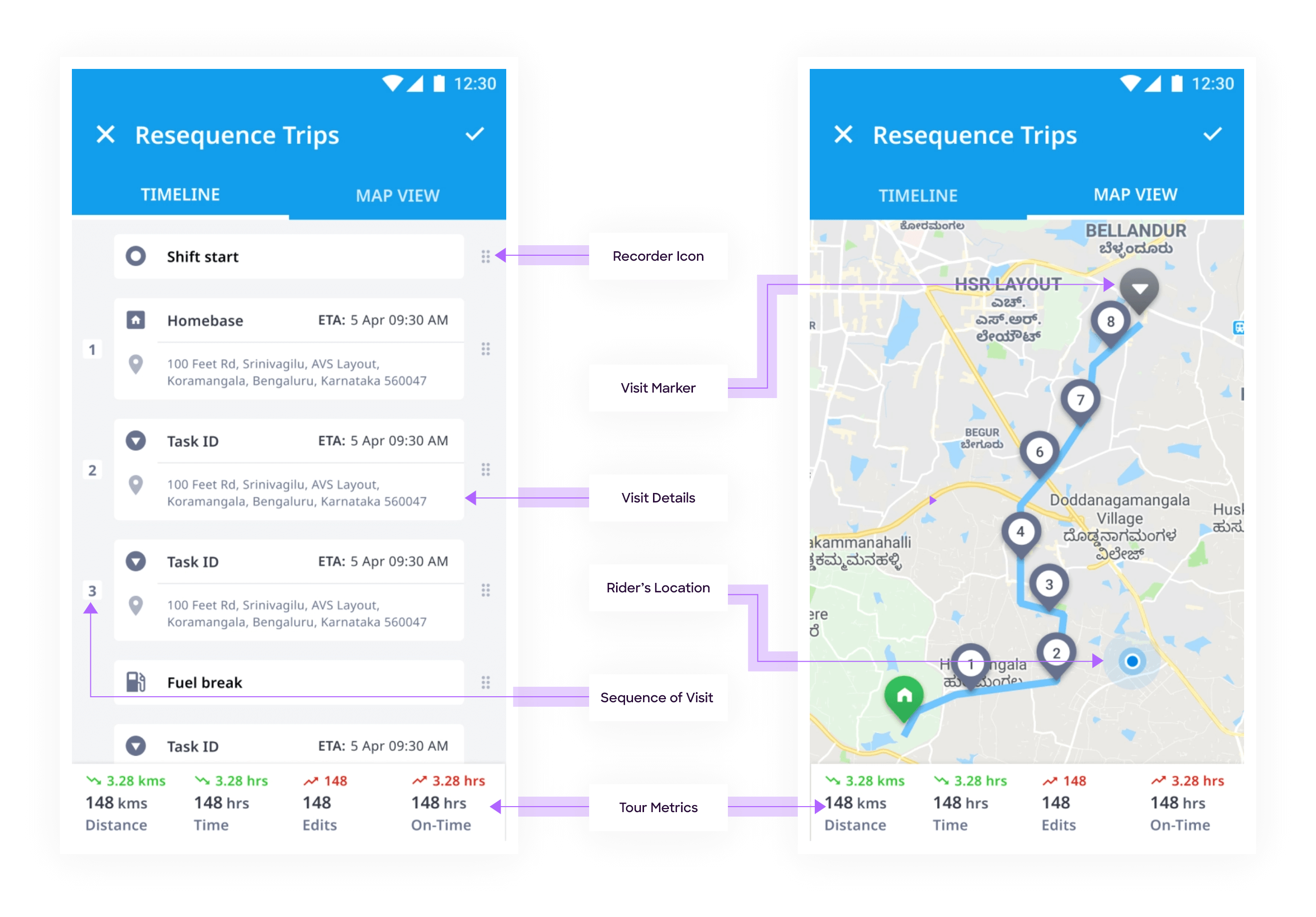Role of fleet management
When it comes to describing changes in the logistics space, ‘overhaul’ would be an understatement, especially since the arrival of the Covid pandemic. Players in the industry who wish to stay competitive have had to come to terms with three key facts, namely:
Uncertainty will forever be a part of supply chains
Supply chains must be agile enough to meet steep end-consumer demands
Manual fleet and supply chain management cannot enable agility, especially at scale
How does one reconcile with these facts to stay competitive? In the coming sections, we will understand the importance of optimizing fleet operations; why technology solutions provide the quickest and most cost-effective way of promoting agility and dealing with uncertainty, and why Locus fleet tracking solution should be your go-to choice for optimizing your fleet management practices.
What is fleet management?
Fleet management is an essential operation for the efficient functioning of logistics operations. It involves ensuring that the overall costs of transportation, fleet and resource utilization, and regulatory compliance of a fleet are at their optimal. All of these measures are instrumental to improving customer satisfaction, increasing revenues, and bringing agility to a fleet.

Enabling supply chain visibility, which means that all relevant stakeholders know where shipments are at all times and in real-time, is important for fleet management. This is easier said than done, especially since the larger a supply chain, the more complexities they involve. Developments in technology have now made it possible for deploying scalable fleet management solutions, right from the first mile to the all-mile.
Some of its main capabilities include:
Fleet Tracking
Providing messaging / alerts
Predicting estimated time of arrival (ETA)
Providing dashboards
Enabling carrier integration
Key components of fleet management
- Fleet managers
- Responsible for the overall optimization of fleet operations, right from the strategic aspects of vehicle selection to the execution aspects such as route planning and compliance. Fleet managers are also the first point of contact for resolving any snags on the ground. To efficiently manage the colossal order volumes in a day, they need essential features like analytical reports and real-time visibility. These features help fleet managers make strategic fleet management decisions critical for business growth.
- Truck fleet management
- Trucks are the lifeline of any logistics operation. Given their size and the large volume of shipments they can carry, any initiatives that can ensure: savings in fuel, increase the volume of cargo they carry on each trip, and reduce empty miles goes a long way in contributing to the bottom line and improving customer satisfaction.
- Fleet drivers
- Responsible for the delivery of all shipments, fleet drivers can optimize their performance with the help of fleet management services, which often provide the quickest possible routes that save on fuel and improve metrics around deliveries. They work closely with fleet managers to prevent SLA breaches in case of unforeseen obstacles.
- Fleet maintenance
- A cornerstone of fleet management, fleet maintenance involves those practices that keep the health of all the vehicles in a fleet intact. Regular servicing of vehicles, gauging of fuel efficiency, and replacement of worn-out components, among other operations, fall under this category.
The role of fleet management solutions in supply chain management
To make incremental improvements in fleet operations, it is essential to utilize the fleet capacity in the best possible manner. With improved fleet utilization, businesses can improve productivity, minimize fleet risks, and increase their efficiency.
And taking the appropriate swift action can only be possible if fleet managers know where and how uncertainty has struck the supply chain, communicate to the relevant stakeholders, and optimize fleet performance to minimize errors. This is where fleet management solutions come into the picture.
Growth of the fleet management solutions
Estimated growth of the market is
$59.08 billion by 2028


The fleet management services market has been showing robust growth and maturation. The trend is expected to continue in the coming years due to the following reasons:
It caters to essential demand of consumers: Enhanced fleet management capabilities has proven its ability in improving customer satisfaction. Customers often demand updates on the status of their shipments in real-time. Thus, what was once used as a tool for differentiating brands from the competition has now become a necessity.
Improves communication: Delivery Orchestration software allows for seamless communication between various stakeholders, which promotes proactivity among team members. It in turn improves productivity and customer satisfaction.
Provides opportunities for reducing costs: The large volume of data being captured can be analyzed to provide insights on optimizing costs, navigating fleets better, managing delivery resources more effectively and making overall better business decisions.
Improves efficiency: As the saying goes, “You cannot improve what you cannot quantify.” Supply chain transparency can expose those areas where resources are being inefficiently utilized and corrective action can be taken.
Quicker to deploy: Fleet management solutions take an average of three to six months to implement, making them relatively quicker and less resource-intensive to deploy.
Want To Know How Locus Can Boost Your Profits?
Why prefer Locus for all-mile fleet management?
Fleet tracking system is one of Locus’ flagship products that provides end-to-end fleet management solutions. What sets fleet tracking software apart from other fleet management solutions is that it also provides advanced capabilities, including:
Advanced analytics
Network visibility
Real-time updates on key metrics like fuel consumption, idling time etc.
Collaboration
Facilitating payments from end-consumers
- Real-time updates to the end-consumer
- End consumers that receive shipments can also benefit from fleet management solutions as they can track the status of their shipments. Fleet tracking solution is powered by Artificial Intelligence (AI) and Internet of Things (IoT), which enables powerful capabilities that can help fleet managers to stay on top of any potential service level agreement (SLA) breaches. Rest assured that logistics stakeholders using fleet tracking solutions are being backed by the most advanced technology in the Transport Management System and fleet management space.
- Timely alerts and notifications
- With the help of fleet monitoring software, fleet managers can keep track of the progress of individual tours and get highly accurate estimated times of arrival (ETAs), reassign tasks if needed, and be notified of any delays from the get-go. The solution can also provide insights that can benefit fleet drivers with shorter trip durations, faster responses to red flags, and improved productivity.
- Analytics and Insights
- Aside from the advanced features, fleet tracking solutions come with diverse, intuitive interfaces that never lose sight of users’ needs. Managers can have extensive visibility of their operations across a range of metrics through a control tower interface. They can even get custom reports that bring up important metrics on mileage, driver behavior, idling times among others, for making strategic decisions.
- Easy-to use support application
- Delivery executives on the ground get access to an exclusive app, Locus on the Road (LOTR) where they can view optimal routes, statuses of various tasks, and electronic proof of delivery. And the end customer can keep track of their shipments, communicate with the fleet manager and provide overall feedback through a white-labeled interface.
Locus Fleet tracking software: Under the hood
Clearly from above, we can see that Locus fleet tracking software is a feature-rich fleet management software. To best meet the needs of key stakeholders, fleet tracking system consists of three distinct components, namely:
Real-time tracking: For Fleet managers and supervisors
Locus driver companion app: An app that assists delivery executives
Locus tracking link: A white-label feature that shows the progress of deliveries for the end customer
Here’s a close look at each of these components:
Live View: The command center
Live View is a dashboard that provides fleet managers the control tower-level visibility they need to optimize their fleet. It shows the progress of tasks assigned by the dispatcher in real-time in an intuitive, easy-to-track format as shown below.

Through this main page, a wide variety of tasks can be quickly executed, including:
- Creating new tasks and resequencing or editing the details of existing ones to boost customer delight
- Receiving alerts and notifications on delays and SLA breaches
- Monitoring Homebase and customer visit details
- Setting up geofences
- Monitoring the progress of existing tasks (up to 150,000) in real-time and getting accurate ETAs
- Gathering insights for impactful decision making by filtering relevant data points
- Receiving alerts from customers through tracking link
- Monitoring carbon emissions data
- Reviewing execution details like proof of deliveries, cancellation reasons, and line items delivered
- Tracking the health of various tours according to metrics such as:
Task execution progress
SLA breaches
Sequence edits
Volume utilization
Weight utilization
Custom Resource utilization
Distance traveled vs planned
Time traveled vs planned
Live View also provides a more granular, map-based view of operations by showing the progress of individual riders on the routes assigned.
This view also comes with a host of functions such as:
- Identifying all active riders
available - Monitoring and maximizing the rider’s utilization on the Rider Time Utilisation Screen
- Tracking information and metrics related to all riders such as stoppage/idling time, distance covered, time taken for tasks, etc.
- Tracking the current location and routes taken by riders on the map
- Sharing important rider information with end customers such as temperature through tracking link
Locus driver companion app: The app that makes things happen
Locus driver companion app is an important link in fleet tracking software’s holistic set of features. It is the app that all riders under the fleet tracking system’s umbrella use to complete their assigned tasks. This makes it the primary source of data on-ground that populates the dashboards and updates the metrics of real-time tracking.

Depending on the requirements of the management, locus driver companion app allows riders an important range of functionalities, including:
- Adding, accepting, rejecting, or rescheduling the tasks assigned
- Viewing the optimal route of an ongoing task on a map
- Communicating with end-consumers in a data-secure manner
- Facilitating communication between fleet managers and riders through calls and text
- Updating the status of tasks after the completion of certain milestones
- Receiving alerts and notifications of changes in tasks, routes, and SLA breaches
- Facilitating the collection of proof of delivery such as images of parcels and signatures
- Providing feedback for improvement
of the app

Tracking Link: Enabling true customer satisfaction
Tracking link is a relatively smaller, but equally important feature of fleet tracking solutions. Through Locus tracking link, the end-consumer can gain visibility on the status of their shipment. It is also the first line of communication between a logistics stakeholder on fleet tracking software and their end-consumer via riders and customer service executives. Communication between the end-consumer is reflected on real-time tracking. This ensures that everything possible can be done to ensure customer delight at the backend.
In essence, Locus tracking link provides core functionalities to the end-consumer such as:
- Current status of shipment (Dispatched, canceled or completed)
- ETA of shipments
- Total amount to be paid or
payable
- Communication portal with the logistics provider for providing feedback or complaints
- Routes taken by riders on a map
- Rider details such as name, phone number, temperature
There are no two ways about it: Fleet management is essential to optimizing supply chain performance and customer satisfaction. And technology solutions are the best way forward. To know how fleet tracking solutions can revolutionize your fleet management practices and enable a new level of supply chain transparency, click here for a demo today!
Resources

Case Study
How to increase operational efficiencies in E-commerce
With E-commerce becoming more complex, thanks to increasing customer demands, it is imperative to increase operational efficiencies across all-miles.
Read moreWhitepaper
The Future is Now: Why Transportation Management Systems are Indispensable to Growth in Logistics
Read moreRunning an e-commerce business is all about offering convenience and keeping the promise of speedy deliveries. Now optimize your e-commerce supply chain with AI-powered logistics solutions by Locus.
Get in touch with our experts for a quick tour of our solutions.









